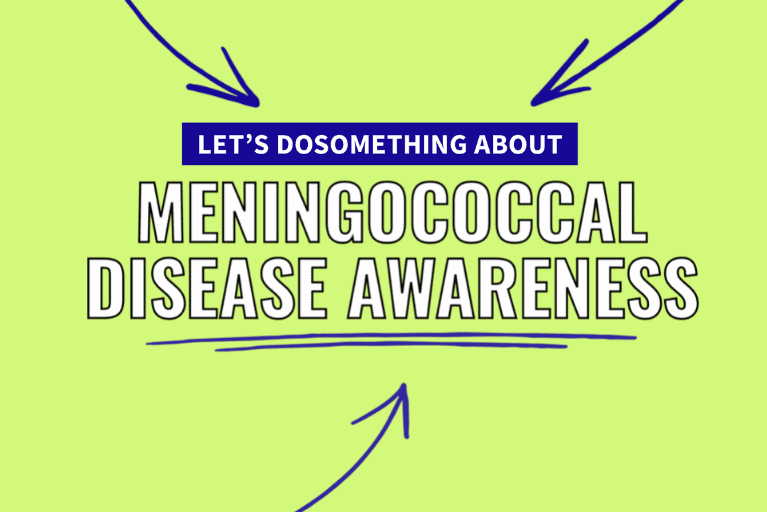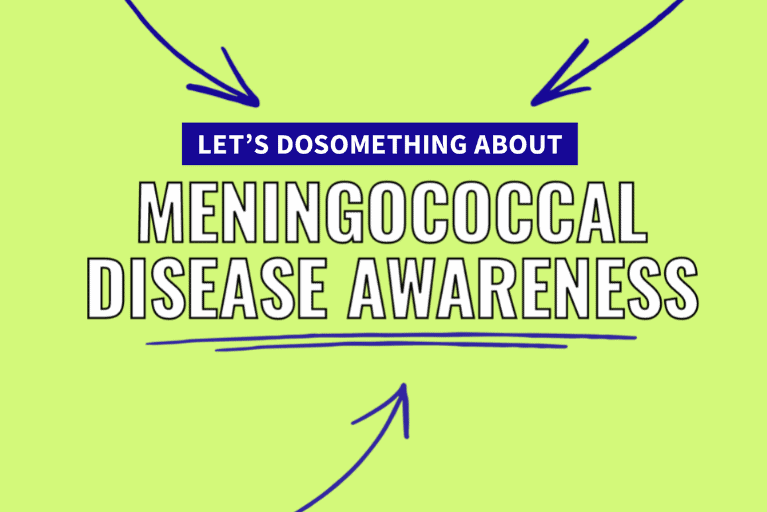
What is Meningococcal Disease?
Meningococcal (muh-nin-jo-cok-ul) disease is a serious bacterial illness that can lead to severe swelling of the tissues surrounding the brain and spinal cord (meningitis) or infection of the bloodstream (meningococcal septicemia). Pneumonia can also occur but is less common.
According to the Centers for Disease Control and Prevention (CDC), meningococcal bacteria spread through the exchange of respiratory and throat secretions like saliva or spit (e.g., by coughing, living in close quarters, kissing).
Burden
Anyone can get meningococcal disease, but those at increased risk include:
- Infants younger than 1 year
- Teens (adolescents) and young adults age 16-23 years
- College students
- People with certain medical conditions that affect the immune system such as HIV
- Microbiologists who routinely work with isolates of Neisseria meningitidis, the bacteria that cause meningococcal disease
- People in a commnunity experiencing an outbreak
- Individuals traveling to a country where meningococcal disease is epidemic or highly endemic
- Military recruits
Even with treatment, approximately 1 in 6 people with invasive meningococcal disease will die, sometimes in as little as 24 hours. Of those who survive, 1 in 5 may suffer serious and permanent complications including brain damage, kidney damage, hearing loss, and amputation of arms, legs, fingers, or toes.
According to the Centers for Disease Control and Prevention, cases of meningococcal disease have increased in recent years and now exceed pre-pandemic levels. In 2024, 503 cases were reported, the largest number of US meningococcal disease cases since 2013.
Symptoms
Early meningococcal disease symptoms are often similar to influenza (flu) which can cause a delay in diagnosis and treatment. Symptoms usually progress very quickly and may include a combination of the following:
- Fever
- Headache
- Stiff neck
- Confusion
- Nausea, vomiting
- Exhaustion
- Purplish rash
Death can happen in as little as 24-48 hours. People who experience these symptoms, especially if they are unusually sudden, progressive, or severe, should be examined as soon as possible by a healthcare professional.
Prevention
Keeping up to date with recommended vaccines is the best way to protect against meningococcal disease. 3 types of meningococcal vaccines are currently available in the US (MenACWY, MenB, MenABCWY).
CDC recommends routine MenACWY for:
- All preteens age 11-12 years
- All teens age 16 years (booster dose)
- Children and adults at increased risk for meningococcal disease
CDC recommends routine MenB vaccine:
- Individuals age 10 years and older at increased risk for meningococcal disease
Teens and young adults (age 16-23 years) also may get a MenB vaccine
CDC recommends the combination MenABCWY vaccination as an option for:
- Individuals age 10 years and older who need MenACWY and MenB at the same visit
Talk with a trusted healthcare professional about missed doses of MenACWY and about MenB vaccination.
CDC recommends meningococcal vaccines for adults at increased risk, including:
- Those with certain medical conditions
- International travelers to areas where meningococcal disease is endemic
- Those whose jobs involve working with meningococcal bacteria
- College students
- Military personnel
- Those in a community experiencing a meningococcal disease outbreak
Treatment
Meningococcal disease can be treated with antibiotics, but quick medical attention is extremely important to help reduce the risk of death. Depending on how serious the infection is, people with meningococcal disease may need other treatments, including:
- Breathing support
- Blood pressure medications
- Surgery to remove dead tissue
- Wound care for skin damage
Updated July 2025
Source: Centers for Disease Control and Prevention, World Health Organization
Related Resources

Ben’s Story (Meningococcal Disease)
A 6-year-old was hospitalized and permanently lost all hearing in his left ear due to bacterial meningitis. Now he wants others to know about life-saving vaccines …

India’s Story (Meningococcal Disease)
Years later, a young woman still struggles with issues from meningitis she had as a teen

Dash’s Story (Meningococcal Disease)
An 18-year-old high school athlete battles sepsis and meningococcal disease
Related Posts

ID News of Interest: Bird Flu, Measles, and Meningococcal Disease
CDC issued health alerts on bird flu, measles, and meningococcal disease. Read the latest news including insights and explanations from infectious disease experts …

Debunking 5 Common Health Myths
Although the COVID-19 pandemic has clearly demonstrated the importance of public health, the prevalence of medical misinformation online is making it harder than ever for young people to tell the difference between fact and fiction when it comes to protecting their own health

NFID and DoSomething.org Launch New Program to Educate Young People about Meningococcal Disease Prevention
NFID and DoSomething.org have launched the “Complete What’s Missing” program, which aims to educate young people about meningococcal disease and the importance of prevention through vaccination
